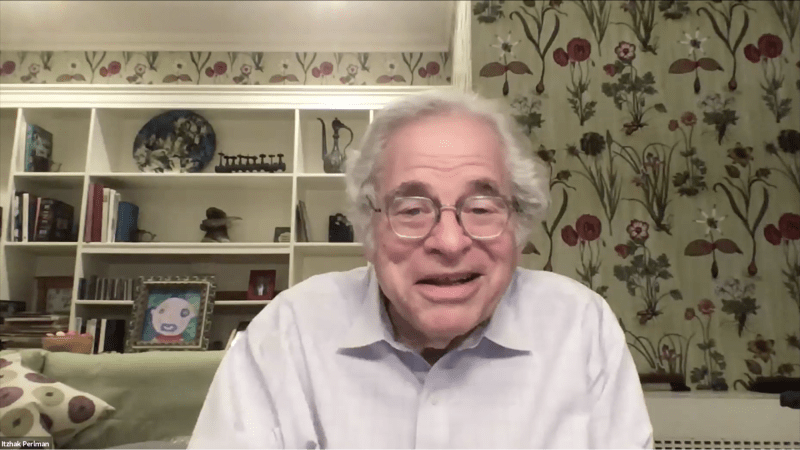World-renowned violinist Itzhak Perlman spoke to the students of Stanford Symphony Orchestra Online (MUSIC 151D) on Nov. 17. Perlman, who’s been performing internationally since his teenage years, has a long list of accolades, including a Grammy Lifetime Achievement Award, four Emmys and the Presidential Medal of Freedom. From the comfort of his Long Island home, Perlman answered questions from members of Stanford’s student orchestra. He was the last in the course’s series of guest speakers from the music-making world. Earlier in the quarter, students heard from numerous professional musicians, such as jazz’s Joshua Redman, the Kronos Quartet and film composer Laura Karpman, among others.
SSO Director Paul Phillips didn’t initially have Perlman on the speaker roster. “I just reached out to him and was delighted when he agreed to do it,” he commented. Phillips has conducted with Perlman soloing on numerous occasions, but his most memorable encounter was a surprise at a 1990 concert at Carnegie Hall: “When I walked on stage to begin the concert and took my bow, straight ahead of me in the center box [of the audience] was Itzhak Perlman!” Perlman’s history of performing at Stanford predates Phillips, though. As the story goes, Perlman’s vocal disapproval of Memorial Auditorium’s acoustics after performing there led to the construction of Bing Concert Hall.
Paul Phillips taught Orchestra Online in the fall and spring of 2020 in place of SSO. “I created this course for our orchestral students, who no longer had the opportunity to play together in orchestra, as a way to broaden their musical knowledge while doing all I could to preserve and strengthen our orchestral community,” he explained. With Stanford’s plans to invite more students to campus for winter quarter, Phillips hopes in-person SSO can resume. “Once students are back on campus and in-person ensemble activity can resume, then we’ll discontinue Orchestra Online and return to live music-making, which we all eagerly await! But if the lockdown has to continue, then I’ll keep offering Orchestra Online with a new line-up of guest speakers next quarter.”
The Q&A session covered a number of musical matters but centered around two main themes: Perlman’s experiences and his advice for young musicians. On the former, Perlman discussed everything from early fame to his pre-concert rituals. When asked about playing for Barack Obama’s first inauguration, Perlman recalled it as “very exciting, [but] very cold.” He continued with nostalgic stories of the former presidents, from his first time in the White House during the Nixon administration to eating dinner with the Obama’s.
Perlman’s naturally radiant personality shone through in many of his answers. His passion for culinary arts is a great example, and one which he has been vocal about for many years. When Paul Phillips asked if there were any activities the extended quarantine has allowed him to get to, Perlman, without missing a beat, responded, “mak[ing] French onion soup.” When discussing his solo Bach interpretations, he lamented, “I’ve been accused many times of making Bach sound too romantic . . . but I’m sure that people like Bach, Mozart, Haydn or Beethoven would love to hear a modern performance of their works.” Though most haven’t encountered this exact problem, his fight to express himself and stick to his guns is a universally relatable one.
Young violinists might take solace in some of Itzhak Perlman’s struggles as one of history’s greatest violinists. One familiar sentiment that he shared is his opinion that “Bach unaccompanied is a real pain.” Later, Perlman discusses the fatigue of playing a piece for a long time, citing his yearlong study of the Lalo Symphonie Espagnole with Ivan Galamian: “I was Lalo-ed out.” He also mentioned that he’s currently practicing pieces he never played before, admitting they’re “still too difficult.” If you believe violin is the hardest instrument, you are not alone.
Also an accomplished teacher, Perlman offered general musical wisdom and advice specifically for the violin to the students of SSO. He restated his mantra on practice: “If you practice slowly, you forget slowly.” Perlman also emphasized listening to recordings and focusing on the timing of silences in phrases as two key factors to improving playing, among other ideas. At the same time, Perlman identifies truly great performers by an unteachable “innate talent,” which he identifies as “the feel that you are just totally amazed by the music that you are playing.”
To conclude, Itzhak Perlman assured that music-making need not stop in a pandemic. “It’s not an ideal world: I’m not gonna tell you it’s very easy, because it’s not. Try and be creative! We are all musicians, and hopefully we [stay] dedicated to music. Let’s use music to help ourselves. This thing will go away — it’s a matter of time.” While it was certainly a treat to talk with Perlman on Zoom, the Stanford Symphony Orchestra is looking forward to the day he can fly down in person to play in Bing Concert Hall.
Contact Peyton M. Lee at peytonl7 ‘at’ stanford.edu.
